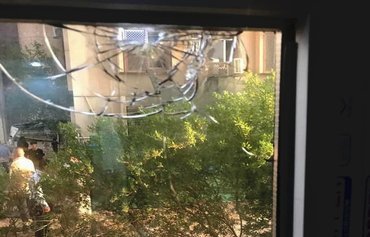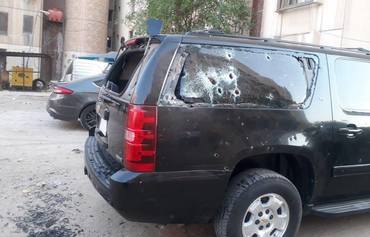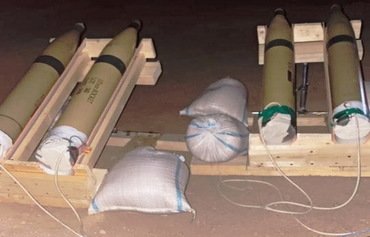Recurring attacks by militias aligned with the Islamic Revolutionary Guard Corps (IRGC) on Baghdad's Green Zone only serve to validate the maximum pressure campaign the US is pursuing against the Iranian regime, experts said.
Since early August, around 40 rocket attacks have targeted US interests in Iraq. On September 30th, six rockets were fired from Ninawa province at Erbil airport, where US troops are based, the Kurdish region's counter-terrorism division said.
The counter-terrorism division accused the Popular Mobilisation Forces (PMF), a paramilitary network dominated by Iran-aligned factions, of responsibility.
On September 28th, rockets hit a village near Baghdad airport, where US troops are stationed, killing five children and two women from the same family.
The US State Department pointed the finger at Iran-backed militias operating in Iraq, saying they "pose an unacceptable danger".
Missile attacks on Baghdad airport and the Green Zone, where European, US, British and UN missions are based, could only have been ordered by the IRGC, political and security expert Ahmed al-Hamdani told Diyaruna.
IRGC-backed militias in Iraq include Kataib Hizbullah, Harakat al-Nujaba and Asaib Ahl al-Haq.
The attacks confirm to Iraqis that they are facing a threat due to the IRGC's desire to "turn their country into an arena for a proxy conflict", al-Hamdani said.
They affirm to the international community the validity of the US's maximum pressure campaign, which aims to "persuade the Iranian regime to change its practices and stop interfering in Iraq, Syria, Yemen and Lebanon", he said.
The timing of the attacks and their synchronised nature "confirm that they are not haphazard or random acts by the militias, but rather a planned systematic action by the IRGC", he said.
No alternative to rule of law
Iraqi political affairs researcher Mohammad al-Tamimi told Diyaruna it would be a huge loss for Iraqis if the US follows through on its threats to close its embassy in Baghdad because of attacks on the Green Zone.
This would isolate Iraq, he said, adding that Iraqis would lose opportunities for humanitarian, cultural, educational and economic support.
"Most importantly, they will lose an ally that was a major reason they are rid of the 'Islamic State of Iraq and Syria' (ISIS)," he added -- all because of the Iran-backed militias.
Iraqi forces are continuing to pursue the perpetrators of attacks carried out with Katyusha rockets and improvised explosive devices (IEDS), Joint Operations Command spokesman Maj. Gen. Tahseen al-Khafaji told Diyaruna.
"There is no alternative to security, order and the rule of law," he said.
The Middle East is facing a new state of chaos instigated by the Iranian regime and its proxies, Salahaddine University professor of international relations Mohammed al-Araji told Diyaruna.
US sanctions on the Iranian regime have greatly curtailed its interference in the affairs of neighbouring countries, he said, though the Iranian people are undeservedly paying a heavy price for the IRGC's actions.
'Tampering with Iranians' lives'
"The Iranian people are now asking themselves how long will people go hungry because of the regime's dreams and ambitions in other countries," Iranian dissident and political activist Mousa Afshar told Diyaruna.
The IRGC is tampering with the fate of tens of millions of Iranians, who are suffering from the steep devaluation of the national currency and decline in their standard of living, reflected in the record rise of the poverty rate, he said.
The number of unemployed in Iran has reached 30 million, and about 40 million Iranians now live below the poverty line, he said.
Some families are living on less than $50 per month, and child malnutrition is rampant, Afshar said.
This has caused people to question "the amounts being spent on missiles and militias" and ask why these funds are not directed towards the Iranian people.

![A picture taken March 13th shows destruction at Iraq's Karbala airport, one of the areas targeted by US airstrikes against Iran-backed Kataib Hizbullah, following the deaths of two Americans and a Briton. [Mohammed Sawaf/AFP]](/cnmi_di/images/2020/10/07/26407-Iraq-Karbala-airstrike-600_384.jpg)






